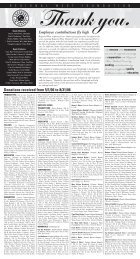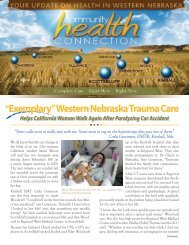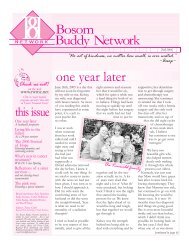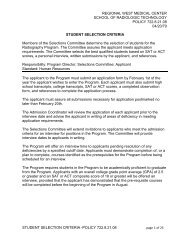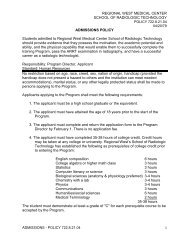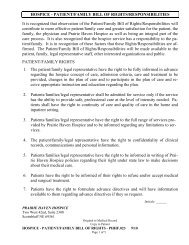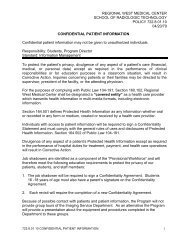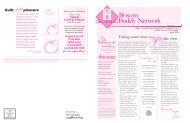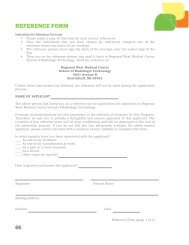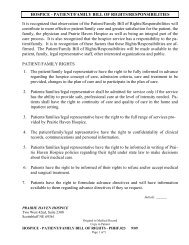School of Radiologic Technology - Regional West Medical Center
School of Radiologic Technology - Regional West Medical Center
School of Radiologic Technology - Regional West Medical Center
Create successful ePaper yourself
Turn your PDF publications into a flip-book with our unique Google optimized e-Paper software.
Academic Policies<br />
mammography, nuclear medicine, ultrasound, computed tomography, interventional<br />
radiography, cardioangiography, magnetic resonance and bone densitometry. This course will<br />
cover sectional anatomy <strong>of</strong> the body.<br />
390 Clinical Education II-A<br />
This course is a continuation <strong>of</strong> Clinical Education 290 and 295. Students, after demonstrating<br />
competency have more indirect supervision. Students use this increased independence to<br />
reinforce pr<strong>of</strong>essional skills. Students schedule themselves for radiography clinical areas and<br />
other modalities in department.<br />
395 Clinical Education II-B<br />
A continuation <strong>of</strong> Courses 390 Clinical Education I-A. Students, with indirect supervision, are<br />
allowed more independence to reinforce skills previously used. Students schedule themselves for<br />
radiography clinical areas and other modalities in the department.<br />
399 Review and Presentation<br />
This course provides students with independent investigation into the various aspects <strong>of</strong> radiology<br />
and the opportunity to present information by posters, case studies and papers. The course also<br />
provides students with the opportunity to prepare for the national certification examination.<br />
ACADEMIC POLICIES<br />
Standards <strong>of</strong> Student Academic Performance<br />
Students enrolled in the program are expected to make satisfactory academic progress toward<br />
completion <strong>of</strong> the program requirements. The program sets academic standards for governing<br />
satisfactory academic progress including probation or dismissal from the program.<br />
Academic Integrity and Pr<strong>of</strong>essional Conduct<br />
Freedom to learn depends upon appropriate opportunities and conditions in the classroom, laboratory,<br />
on campus, and in clinical settings. Faculty, staff, students, and visitors respect the conditions<br />
conducive to such freedom by conducting themselves in a responsible manner, abiding by the policies<br />
and procedures <strong>of</strong> <strong>Regional</strong> <strong>West</strong> <strong>Medical</strong> <strong>Center</strong>. Accordingly, the program has developed general<br />
guidelines pertaining to academic integrity and personal conduct, which provide and safeguard the<br />
rights <strong>of</strong> individuals to exercise fully their freedom to pursue academic goals without undue interference<br />
from others.<br />
Minimum Standards <strong>of</strong> Academic Integrity<br />
In order to assure an understanding between students, faculty and staff concerning what types <strong>of</strong><br />
activities constituting violations <strong>of</strong> academic integrity, several definitions and examples are provided<br />
below. These examples are not intended to be all-inclusive and actions not listed here may also be<br />
considered violations. A violation <strong>of</strong> the standards <strong>of</strong> academic integrity is viewed as a very serious<br />
33



